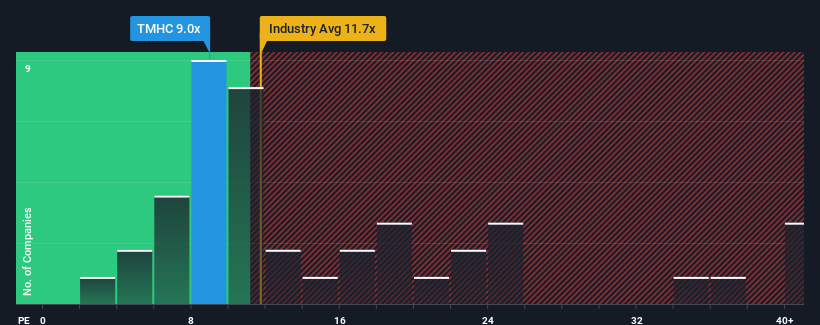- United States
- /
- Consumer Durables
- /
- NYSE:TMHC
It's A Story Of Risk Vs Reward With Taylor Morrison Home Corporation (NYSE:TMHC)

Taylor Morrison Home Corporation's (NYSE:TMHC) price-to-earnings (or "P/E") ratio of 9x might make it look like a buy right now compared to the market in the United States, where around half of the companies have P/E ratios above 18x and even P/E's above 33x are quite common. Although, it's not wise to just take the P/E at face value as there may be an explanation why it's limited.
Taylor Morrison Home has been struggling lately as its earnings have declined faster than most other companies. It seems that many are expecting the dismal earnings performance to persist, which has repressed the P/E. You'd much rather the company wasn't bleeding earnings if you still believe in the business. Or at the very least, you'd be hoping the earnings slide doesn't get any worse if your plan is to pick up some stock while it's out of favour.
Check out our latest analysis for Taylor Morrison Home

Is There Any Growth For Taylor Morrison Home?
There's an inherent assumption that a company should underperform the market for P/E ratios like Taylor Morrison Home's to be considered reasonable.
Taking a look back first, the company's earnings per share growth last year wasn't something to get excited about as it posted a disappointing decline of 26%. Still, the latest three year period has seen an excellent 111% overall rise in EPS, in spite of its unsatisfying short-term performance. Accordingly, while they would have preferred to keep the run going, shareholders would probably welcome the medium-term rates of earnings growth.
Shifting to the future, estimates from the six analysts covering the company suggest earnings should grow by 9.2% per year over the next three years. Meanwhile, the rest of the market is forecast to expand by 10% per year, which is not materially different.
With this information, we find it odd that Taylor Morrison Home is trading at a P/E lower than the market. Apparently some shareholders are doubtful of the forecasts and have been accepting lower selling prices.
What We Can Learn From Taylor Morrison Home's P/E?
Typically, we'd caution against reading too much into price-to-earnings ratios when settling on investment decisions, though it can reveal plenty about what other market participants think about the company.
We've established that Taylor Morrison Home currently trades on a lower than expected P/E since its forecast growth is in line with the wider market. When we see an average earnings outlook with market-like growth, we assume potential risks are what might be placing pressure on the P/E ratio. At least the risk of a price drop looks to be subdued, but investors seem to think future earnings could see some volatility.
The company's balance sheet is another key area for risk analysis. Our free balance sheet analysis for Taylor Morrison Home with six simple checks will allow you to discover any risks that could be an issue.
You might be able to find a better investment than Taylor Morrison Home. If you want a selection of possible candidates, check out this free list of interesting companies that trade on a low P/E (but have proven they can grow earnings).
Valuation is complex, but we're here to simplify it.
Discover if Taylor Morrison Home might be undervalued or overvalued with our detailed analysis, featuring fair value estimates, potential risks, dividends, insider trades, and its financial condition.
Access Free AnalysisHave feedback on this article? Concerned about the content? Get in touch with us directly. Alternatively, email editorial-team (at) simplywallst.com.
This article by Simply Wall St is general in nature. We provide commentary based on historical data and analyst forecasts only using an unbiased methodology and our articles are not intended to be financial advice. It does not constitute a recommendation to buy or sell any stock, and does not take account of your objectives, or your financial situation. We aim to bring you long-term focused analysis driven by fundamental data. Note that our analysis may not factor in the latest price-sensitive company announcements or qualitative material. Simply Wall St has no position in any stocks mentioned.
About NYSE:TMHC
Taylor Morrison Home
Operates as a land developer and homebuilder in the United States.
Flawless balance sheet and undervalued.
Similar Companies
Market Insights
Community Narratives



